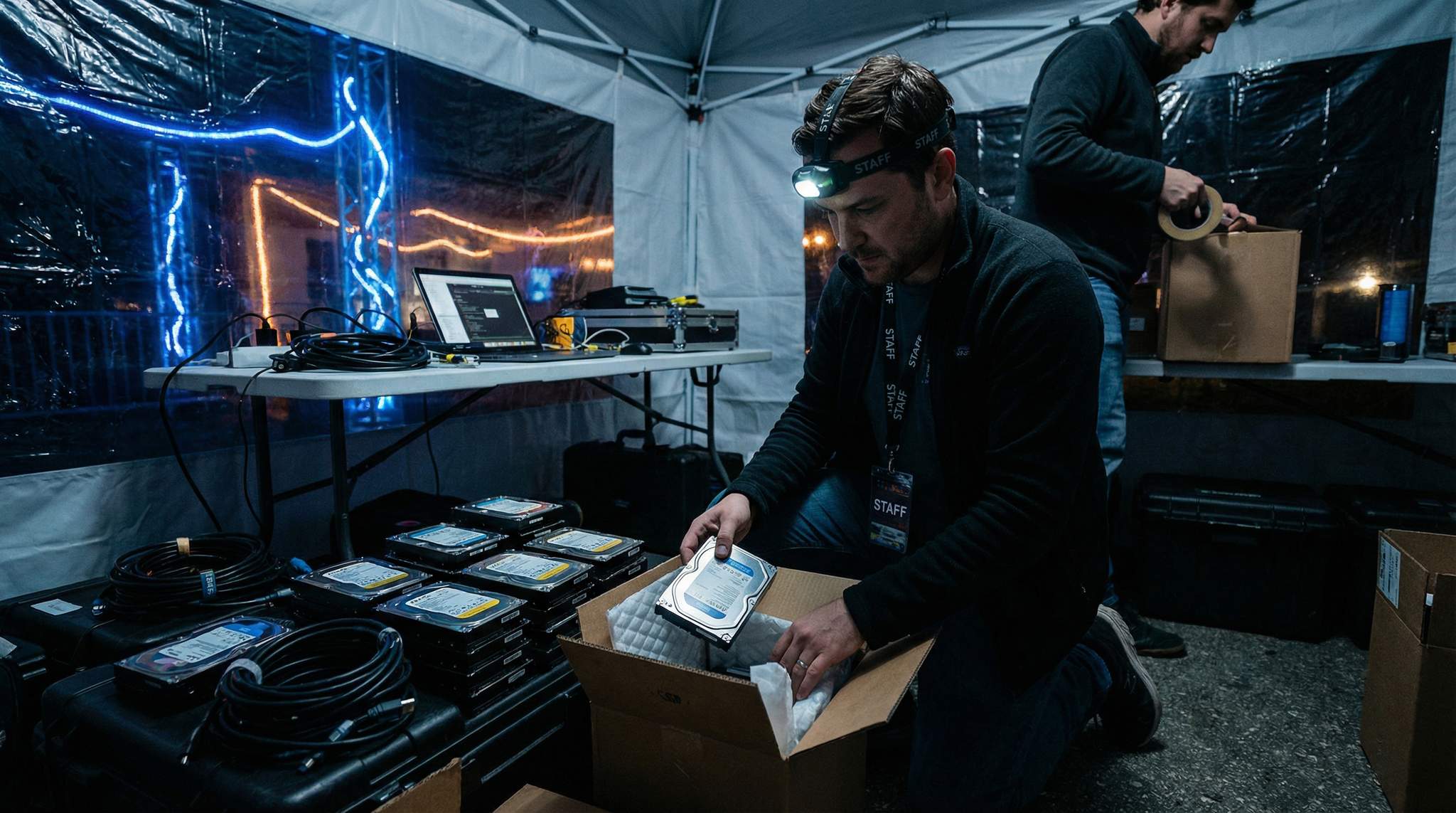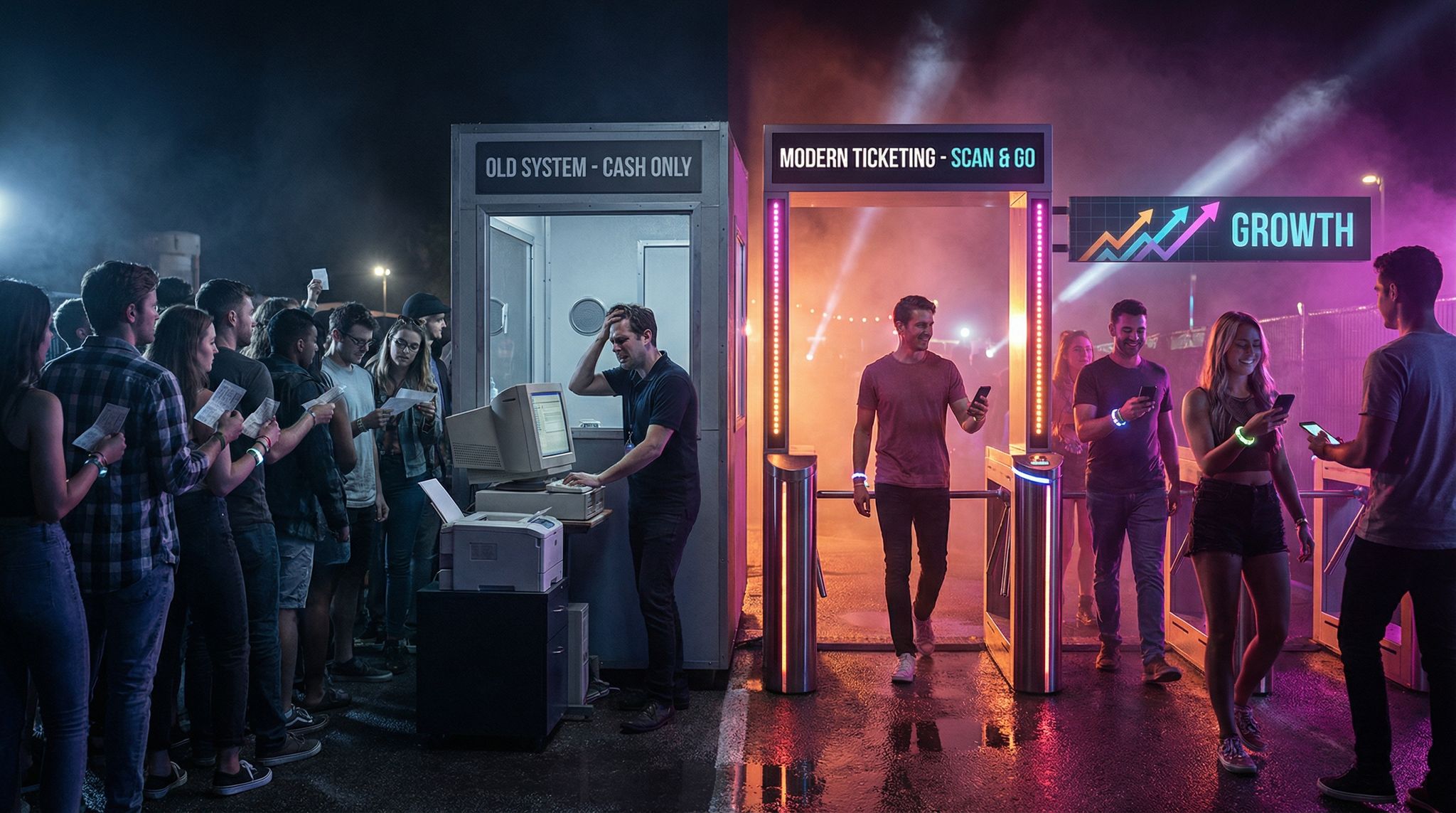When the final film has screened and the awards are handed out, a festival producer’s work isn’t over. Post-festival archiving and returns are critical steps that ensure trust with filmmakers and prepare the ground for your next edition. Seasoned festival organizers know that how you handle filmmakers’ materials after the event can impact your festival’s reputation, community goodwill, and operational smoothness in the future. This guide shares decades of hard-earned wisdom on closing out a film festival responsibly – from swiftly returning drives to safeguarding digital files – all in an effort to “keep your house clean” for next year.
Return Drives Promptly and Securely
For film festivals, screening copies often arrive on physical drives (like DCP hard drives or USBs) or secure digital links. If you have physical media, make it a top priority to return these drives to their owners as soon as the festival concludes. Filmmakers and distributors typically need their drives back quickly – they might be heading to another festival or planning other screenings. Delays or lost drives can erode trust and potentially jeopardize a film’s next showing.
Organize a systematic drive return process: Treat this like an extension of your print traffic duties. In the past, large festivals even employed dedicated print traffic coordinators to monitor the shipping and receiving of film prints. Take a page from their book by maintaining a detailed log or spreadsheet of every drive in your possession, including the film title, format, filmmaker contact, and shipping details. This log is your checklist to ensure nothing is overlooked.
Use secure, trackable shipping for any drives that aren’t being picked up in person. Opt for reputable couriers and always get a tracking number and insurance for valuable content. For international films, double-check customs requirements and attach proper documentation (e.g. a proforma invoice stating “no commercial value, for cultural exhibition”) to avoid border hold-ups. It’s wise to email the tracking number to the filmmaker or distributor so they know the item is on its way.
Data-Driven Event Marketing
Track ticket sales, demographics, marketing ROI, and social reach in real time. Exportable reports give you the insights to make smarter decisions.
Examples from the field: The International Film Festival Rotterdam (IFFR) drastically reduced the burden of returns by using a digital upload system – in 2019, 80% of their films were delivered online, which meant far fewer hard disks coming in (and needing to be sent back), saving a lot of administration, time, office space and money. Many top festivals have clear policies for returning media. At the Cannes Film Festival, for instance, filmmakers are responsible for retrieving their screening copies, and the festival does not automatically ship materials back after the event, as outlined in Cannes’ official material retrieval policies. This means producers must either pick up their drives by a certain date or cover shipping themselves. Cannes’ approach underlines the importance of making return arrangements clear from the start – and ensuring that whatever your policy, it’s executed promptly. On the other hand, some smaller festivals make it a point of pride to personally ship back every submitted drive within a week of closing night, absorbing the cost as a courtesy to filmmakers. No matter your festival’s size or resources, the goal is to have every drive back in the right hands quickly and safely.
Confirm Receipt and Follow Up
Returning a package is only half the battle – you also need to know that it arrived. Always confirm receipt for each drive or film copy you send back. This can be as simple as an automated delivery confirmation from the courier, or better yet, a quick personal email to the filmmaker: “Just checking in to ensure you’ve received your film drive – please let us know that it arrived safely.” This gesture shows professionalism and care.
Planning a Festival?
Ticket Fairy's festival ticketing platform handles multi-day passes, RFID wristbands, and complex festival operations.
If a filmmaker hasn’t confirmed receipt within a reasonable time, follow up proactively. Sometimes shipments get delayed or go astray, and it’s far better for your team to discover and resolve that quickly than for a filmmaker to have to chase you down. Keep those tracking numbers handy until you know everything has been delivered. In cases of lost or damaged shipments (rare but possible), having proper insurance and documentation will be vital to make things right. It’s wise to keep copies of shipment receipts and tracking info until all returns are confirmed and accounted for.
Pro Tip: During the festival wrap-up, assign someone on your team to the role of “return coordinator”. This ensures one person is monitoring all outgoing materials and confirmations. It centralizes communication and avoids anything slipping through the cracks. Festival teams often have debrief meetings; include return-status updates in these until every last item is confirmed returned.
Finally, use this follow-up opportunity to thank the filmmakers again for participating in your festival. A warm thank-you note coupled with the return confirmation leaves a positive last impression. You might even include a short survey link for feedback about their festival experience. Post-festival communication like this not only closes the loop on logistics, but also nurtures relationships for the future.
Offer Archival Services to Filmmakers (LTO and Cloud Backups)
Keeping a copy of a film after the festival might sound counterintuitive – after all, you’re busy sending everything back to its owners. However, forward-thinking festival organizers have started to offer archival solutions as an additional service or goodwill gesture. Independent filmmakers, especially those early in their careers, sometimes lack resources for proper long-term storage of their digital masters. Festivals can turn this gap into an opportunity.
Accept Payments Across 8 Global Markets
Local currency processing in the US, UK, Canada, Australia, New Zealand, India, Indonesia, and Mexico with region-specific payment methods.
LTO (Linear Tape-Open) is a popular long-term storage technology in the film industry. It uses magnetic tape cartridges that can safely hold large amounts of data for 30+ years in proper conditions, a capability highlighted in Filmmaker Magazine’s guide to long-term storage. Some festivals partner with post-production houses or archival institutions to offer filmmakers the option of copying their film onto an LTO tape for archival. This could be done for a fee (as an extra service) or as part of an awards prize or partnership. For example, a documentary festival in Canada partnered with a local media archive; all winning filmmakers were given a chance to have their final film masters copied to LTO at cost price, ensuring a preservation-quality backup for the future.
Cloud archiving is another modern solution. A festival might team up with a cloud storage provider (such as Amazon Web Services, Google Cloud, or a regional data centre) to offer discounted or free storage for festival entries. Imagine telling a filmmaker: “We can securely archive your DCP in the cloud for five years, so you’ll always have a backup.” This kind of service can set your festival apart. It might be offered as an upsell or perhaps in exchange for allowing the festival to keep a copy for its own library or future curated retrospectives (with permission, of course).
Need Festival Funding?
Get the capital you need to book headliners, secure venues, and scale your festival production.
When offering archiving, always obtain explicit consent from the rights holder. Some filmmakers won’t want any additional copies of their film held, and that’s their prerogative. But many will appreciate the extra security. If you do archive a film, treat it with the same security you would your own vital data – meaning robust access controls, encryption, and redundancy. It’s the filmmaker’s intellectual property, so safeguard it well.
Why go to these lengths? Because digital files are not infallible. Hard drives can crash, files can corrupt or get accidentally deleted. As one panelist at the Tokyo International Film Festival noted, people often mistakenly think that digital files last forever, but “it can be deleted by mistake… File formats and memory devices are always evolving… There is no format that is safe for 100 years” according to insights from the TIFF preservation symposium. By helping filmmakers archive their work – via LTO tape or secure cloud – you’re not only adding value for them, you’re also contributing to preserving cinema culture. Many established festivals even maintain their own film libraries or archives, actively preserving noteworthy films as part of our cultural heritage.
Offering archive services can also be a revenue stream or sponsorship avenue. Perhaps a data storage company sponsors your festival’s “Digital Vault” in exchange for visibility. Or you charge a nominal fee for archiving that helps cover your costs. Either way, it’s a win-win: filmmakers get peace of mind about their work, and your festival strengthens its reputation as a filmmaker-friendly event.
Document Deletions for Privacy and Trust
Just as important as what you keep is what you don’t keep. Filmmakers entrust festivals with their films, which are often unreleased or sensitive content. Once your festival is over, unless you have explicit permission to retain a copy, you should delete all digital copies of the film files in your possession. This is both an ethical practice and, in some regions, a legal one (consider regulations like the GDPR in Europe which emphasise data minimization).
To bolster trust, consider documenting your deletions and informing filmmakers. For example, after the festival you might send a courtesy email: “As per our policy, we have deleted all digital files of your film from our servers as of [date]. We look forward to possibly screening your work again in the future.” By doing this, you’re reassuring participants that their content won’t be used beyond the agreed scope. It’s about transparency and respect.
Internally, maintain a record of deletions – a simple log that notes which files were deleted, from which storage, and when. Not only does this help if any questions arise later, but it also disciplines your team to complete the task. Nothing hanging around means nothing can leak or be accessed without authorisation.
Real-world cautionary tales abound: there have been instances of screeners ending up online, causing filmmakers grief. Often, those aren’t from festivals but rather from careless distribution of screeners during awards season. Nonetheless, a festival should never be the source of a leak. By wiping files clean, you remove that risk. For instance, one U.K. film festival implemented a policy where two staff members had to sign off that each film file was deleted from the festival server and backups – a simple accountability measure that reassured filmmakers and studios.
Additionally, don’t overlook personal data: if you collected any sensitive personal information (for example, passport copies for travel arrangements, or addresses and phone numbers on submission forms), ensure you handle that data according to privacy laws and your own privacy policy. Deleting what you no longer need is just good hygiene.
In short, make “we don’t hold your film without permission” a selling point of your festival’s integrity. It can be featured in your submission guidelines or filmmaker FAQ: promise that aside from archival services a filmmaker opts into, their film files will be removed after the event. This promise can encourage more submissions, especially from creators who might be nervous about where their film could end up.
Keep Your House Clean for the Next Edition
Once drives are returned, archives sorted, and files deleted, your festival operations should feel lighter. Keeping your house clean means wrapping up all loose ends so you can start planning the next festival with a clear slate. Here’s a checklist of things a seasoned festival producer will do in this phase:
-
Equipment and Venue Wrap-Up: Return any rented equipment (projectors, speakers, VR headsets – whatever you hired). Confirm that venues are restored to their original condition. Outstanding invoices for gear or venues should be settled promptly to maintain good relationships with suppliers.
-
Data Organization: Organize and archive the materials you do keep. This includes festival assets like photos, videos of Q&As or panels, recorded live streams, marketing materials, and festival programs. Store these in a structured way (by year, by type) on a drive or cloud storage that the team can reference. These archives are immensely useful for next year’s marketing and for institutional memory. If you have a festival historian or just a long-term staffer, they’ll thank you for making past materials easy to find.
-
Clean Up Communication Channels: Update your website and social media to transition out of “live festival” mode. For example, remove or annotate schedule pages so they show the festival as concluded, and post a thank-you message to attendees. Clear out any generic email inboxes that might be overflowing (e.g. [email protected]). Many festivals also take this time to send out a newsletter wrapping up highlights and perhaps teasing next year – this keeps your audience engaged year-round.
-
Internal Debrief and Documentation: Right after the festival is the best time to hold internal debrief meetings. Gather your team (and volunteers, if feasible) to discuss what went well and what could improve. Document these insights while fresh. Also, compile all key festival data: attendance figures, ticketing reports, budget vs. actual finances, and any notable incidents. Having this documented will aid you when you dive into planning the next edition or when reporting to sponsors and stakeholders. Ticketing platforms like Ticket Fairy can help generate detailed post-event reports that feed into this analysis, saving you time and giving clear insights.
-
Community and Partner Follow-ups: Engage with the local community and partners one more time post-festival. If your festival borrowed community spaces or received volunteer help, express gratitude – perhaps a small post-festival party for volunteers or thank-you certificates for partners. Festivals thrive on goodwill, and showing appreciation ensures people are eager to support you again. Some festivals even organize a “thank you screening” for the host community, showing a popular film from the festival for free as a gesture of thanks.
By thoroughly clearing the decks, you create a smooth path for the next festival cycle. There’s nothing worse than starting planning for next year only to trip over unresolved mess from last year (be it an unpaid bill, an unreturned hard drive, or a clutter of unsorted digital files). A clean, well-documented end-of-festival process is the mark of a professional operation.
As you gear up for your next edition, you’ll be grateful you took these steps. Your team will have institutional knowledge at their fingertips, filmmakers will trust you, and venues and vendors will be happy to work with you again. Essentially, you’re investing in the longevity and reputation of your festival.
Frequently Asked Questions
How should film festivals handle returning screening copies?
Film festivals should return screening copies immediately after the event using a systematic log to track every drive. Organizers must use secure, trackable shipping with insurance for physical media like DCP hard drives. Maintaining a detailed spreadsheet ensures no materials are lost and preserves trust with filmmakers and distributors.
What is LTO archiving for film festivals?
LTO (Linear Tape-Open) is a long-term storage technology using magnetic tape cartridges capable of preserving data for over 30 years. Film festivals often offer LTO archiving as a service to filmmakers, providing a secure, preservation-quality backup of digital masters that outlasts standard hard drives and protects against file corruption.
Why should film festivals delete digital film files after the event?
Festivals must delete digital film files post-event to protect filmmaker intellectual property and comply with data privacy regulations like GDPR. Removing unneeded files prevents unauthorized leaks, data breaches, or accidental distribution. Documenting these deletions reassures filmmakers that their sensitive content is handled ethically and securely.
What is the best process for tracking film drive returns?
The most effective tracking process involves maintaining a centralized log or spreadsheet detailing film titles, formats, and shipping addresses. Coordinators should use reputable couriers that provide tracking numbers and insurance, then email these details to filmmakers. Assigning a dedicated return coordinator ensures all shipments are monitored until delivery is confirmed.
Who pays for return shipping of film festival screening copies?
Return shipping policies vary by festival size and resources. Major events like the Cannes Film Festival often require filmmakers to retrieve drives or cover shipping costs, while smaller festivals may absorb these costs as a courtesy. Clear policies regarding financial responsibility should be established and communicated to filmmakers before the event begins.
How can film festivals offer cloud archiving to filmmakers?
Festivals can partner with providers like Amazon Web Services or Google Cloud to offer discounted or free secure storage for festival entries. This service acts as a digital backup for filmmakers, protecting against hard drive failures. Organizers must always obtain explicit consent from rights holders before archiving any content in the cloud.
What is included in a film festival post-event wrap-up checklist?
A comprehensive post-festival checklist includes returning rented equipment, settling outstanding invoices, and organizing digital assets like photos and marketing materials. The process also involves updating website content, holding internal team debriefs to document insights, and sending thank-you notes to partners and volunteers to maintain community goodwill for future editions.
Why is confirming receipt of returned film drives important?
Confirming receipt ensures that valuable film assets have arrived safely and closes the logistical loop. Proactively verifying delivery through courier notifications or personal emails prevents long-term disputes over lost items. This follow-up demonstrates professionalism and care, strengthening the relationship between the festival organizers and the filmmaking community.





